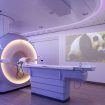
Stressed About Your MRI? Our New...
An MRI (Magnetic Resonance Imaging) exam is one of the important tools your doctor has to diagnose a medical problem. However, patients...
Magnetic Resonance Imaging (MRI) is a powerful imaging device that combines the physical properties of magnetic fields and radio waves to produce detailed, high-resolution images of the human body on a computer. It is one of the most advanced diagnostic tools available for physicians today and can be used to create precise images of muscles, organs, soft tissues, bones, and other parts of the body. Magnetic Resonance Imaging has become an essential method in the early detection and treatment of many types of health problems.
Before the scan, you may be asked to remove some of your clothing and wear a gown. You will need to remove jewelry, watches, pins, coins and other metal items. You will be positioned comfortably on the scanning table. While the test is being conducted, the table will slide inside the tubular magnet. Pads may be used to help keep you still and special antennae or coils will be utilized to enhance the image.
An average MRI scan takes about 30-60 minutes. You will hear knocking and banging noises as the machine operates – this is perfectly normal. You should be as relaxed and as motionless as possible while the scan is taking place. The technologist will be in an adjacent room while the test is being conducted. You will be able to speak to the technologist while the scan is going on through the use of an intercom system.
Keep in mind that because an MRI uses a strong magnetic field to create an image, any metal objects will interfere with the scan. Therefore, avoid wearing clothing with a lot of zippers, metal jewelry, watches, hair products and accessories, and dental devices. It is also best to not wear make-up since some make-up, including mascara, has a metallic base. In addition, we ask that you wear loose-fitting, comfortable clothes during the exam. Please notify our staff if you are pregnant or have any of the following:
If you have questions about your eligibility to undergo an MRI exam, please talk to your physician.
With some MRI exams, a paramagnetic agent (a type of contrast media) is given to patients intravenously in order to improve the quality of the images. The contrast media enhances the resolution of the MRI by increasing the brightness in the parts of the body where the media resides. If it is needed, it will be discussed with you before the exam. Reactions are rare, but please inform your physician if you have ever had an adverse reaction to contrast media. Since contrast media may be used during the exam, it is also important to tell your physician if:
When appropriate procedures are followed, there are no serious health risks to the average patient from undergoing an MRI exam. You will be able to return to normal activities after the scan is complete.
Most insurance companies require preauthorization for an MRI exam. This means that your physician must call your insurance company in advance and obtain authorization to assure that it will pay for the test. For specific information about insurance coverage or for payment questions, please contact your insurance company directly. Radiology at Reliant Medical Group accepts all major insurance plans in Massachusetts.